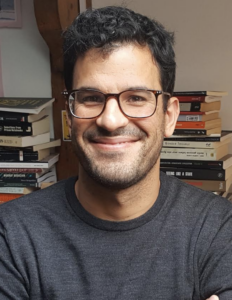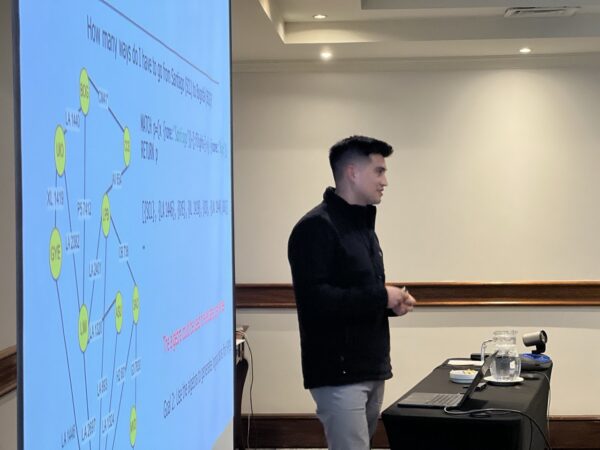Three IMFD researchers receive Fondecyt Initiation Award
Matías Toro (DCC U. Chile), Sebastián Ferrada(Data & Artificial Intelligence FCFM Universidad de Chile) and Naim Bro (UAI School of Government) are the three IMFD researchers who are receiving these funds from ANID. The Fondecyt de Iniciación seeks to strengthen the development of scientific and technological research of excellence through the promotion of new researchers by financing research projects of 2 to 3 years duration in all areas of knowledge.
Differential privacy
Security and privacy guarantees in computer science are one of the most relevant principles in computer security today. In the project of IMFD researcher and academic of the Department of Computer Science at the University of Chile, Matías Toro Ipinza, "Gradual Differential Privacy: Theory and Applications".seeks to contribute to the way in which developers program to ensure privacy and security.

"The objective is to design programming languages that allow differential privacy, data sensitivity and security (confidentiality/integrity) to be analyzed in a stepwise manner, combining static and dynamic methods," the researcher emphasizes. In addition to contributing to theory, there are plans to implement practical prototypes that will make it easier for programmers to integrate these tools into their projects.
In the medium term, the research seeks to theoretically develop practical and accessible programming languages that will allow developers to incorporate differential privacy and security analysis in a progressively flexible and progressively and flexibly into their projects. This includes functional prototyping and validation, laying the groundwork for tools that balance accuracy, flexibility and ease of use.
Divisions in the Chilean elite
The project entitled "The Urban Elite Divide: A Geospatial Examination of the Brahmins vs. Merchants Hypothesis in Santiago, Chile", explores how the Chilean elite is divided into two groups: those whose influences come from educational attainment and intellectual achievement.by Naim Bro, a scholar at the School of Government of the Universidad Adolfo Ibáñez, explores how the Chilean elite is divided into two groups: those whose influences come from educational and intellectual attainment ("Brahmins") and those whose influence emanates from their wealth and economic power ("Mercaderes").

"I hope to provide a new perspective on political divisions in Chile by analyzing how geography and inequality influence the political behavior of urban elites. This project links spatial and electoral data to map and characterize these divisions, shedding light on how privileged groups shape the Chilean political landscape," says the researcher.
The project is closely linked to data science and the work being done at the Millennium Institute Fundamento de los Datos (IMFD). It uses advanced geospatial analysis and machine learning techniques to map and characterize political divisions in Santiago, as well as applying natural language processing (NLP) methods to analyze political speeches and party programs.
Based on concepts of Thomas Piketty and adapted to the Chilean context, the study seeks to analyze the geographic distribution of these elites in Santiago, their evolution over time and their impact on the Chilean political system. Using geospatial and electoral data, it will investigate how the residential and socioeconomic patterns of these elites affect their political preferences and their relationship with political parties.
Tools for tabular databases with graph capabilities
Knowledge networks have emerged strongly as a novel and versatile model for organizing data, offering a number of advantages over other types of organizations: they have flexible schemas, which make it simple to handle the incomplete and changing data of today's world. However, most organizational information is stored in tabular data. At "Knowledge Graph Extraction from Tabular Sources".Sebastián Ferrada, Data & Artificial Intelligence FCFM Universidad de Chile academic and IMFD researcher, seeks to develop tools that allow users to analyze tabular data with the same flexibility and richness that knowledge graphs offer. This includes developing efficient algorithms and data structures to solve tasks such as community detection, optimal path finding and centrality analysis, while maintaining the semantics of the original data and taking advantage of the strengths of relational systems.

"In the medium term, I expect that the results of this research will facilitate the adoption of hybrid models where users can benefit from interoperability between relational and graph systems without the need to modify their current infrastructure. This will enable richer and more advanced analysis on existing data," the researcher says. "In the long term, I aspire that these tools will serve as the basis for a broader transformation in the way organizations and researchers manage, integrate and analyze their data, promoting interoperability as a key standard for combining multiple sources of information in a transparent and efficient manner," he adds.
A fundamental aspect of this project is its focus on open source software, ensuring that the results are accessible to both academia and industry. "This not only broadens the impact of the project, but also encourages its adoption and adaptation in different contexts," the academic emphasizes.
